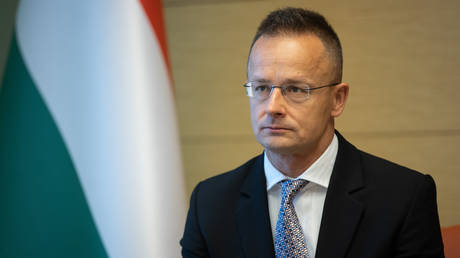Partnership with Russia in Hungary’s national interest – FM
Budapest will stick to its energy contracts with Russia despite sanctions pressure, Hungary’s FM Peter Szijjarto says. source:TROIB RTS

Hungary’s energy security would be at risk without Russian supplies, Peter Szijjarto says
Budapest will stick to agreements with Russia in the energy sphere despite Ukraine-related sanctions and pressure from EU peers, Hungarian Foreign Minister Peter Szijjarto told RT on Friday, on the sidelines of the annual Russian Energy Week forum. The official stressed that his country will always put its national interests first and that energy cooperation with Russia is among its key priorities in this regard.
“Our national interest is to definitely have reliable, mutually respectful cooperation with Russia. Without Russian energy we would not be able to guarantee the safe supply of energy for our country,” he stated, adding that, for Hungary, the supply of energy “is not a political issue or an ideological issue, but a physical one.”
The official noted that his country is in constant contact with Moscow “to make sure our cooperation continues according to our existing contracts.” Hungary continues to buy Russian gas under the 15-year contract with energy major Gazprom signed in 2021, which provides for the supply of 4.5 billion cubic meters of natural gas annually. The country is also buying Russian oil via pipelines that run through Croatia and Ukraine, having secured an exemption from the sanctions imposed by Brussels on Russian crude oil imports last year.
Another large part of Russian-Hungarian cooperation is the work on new reactors for Hungary’s Paks-2 nuclear power plant under a contract with Russia’s Rosatom. According to Szijjarto, the construction process has already started.
“The cut-off walls are now under construction – that gives us hope that by the beginning of the next decade we will be able to connect the two new blocks to the grid, which will increase the nuclear capacity from 2,000 megawatts to 4,400 megawatts,” he said, adding that the project will make Hungary’s power production “more competitive, safer and more environmentally-friendly.”
READ MORE: Hungary looking to expand business in Russia
Szijjarto conceded that the project faced much pressure, especially with the EU continuously pitching the Russian nuclear industry as a potential candidate for sanctions. However, according to the foreign minister the EU is unlikely to go through with these threats.
“We made it very clear that we will not agree to any sanctions package which will include the nuclear industry… because for us it would be totally against our national interests if the nuclear industry was under sanctions. And since the US has bought 416 tons of uranium from Russia during the first half of this year, I think no real arguments are there for the EU to put the Russian nuclear industry under sanctions… that would be a huge hypocrisy.”
Szijjarto reiterated previous statements that the West’s anti-Russia sanctions policy has failed, and urged the collective EU to help Russia and Ukraine bring the conflict to an end instead of heaping more punitive measures on Moscow.
“The EU is struggling when it comes to economy and when it comes to competitiveness, it’s obvious – there are figures – China has already overtaken us when it comes to share of global GDP. So, the EU should make the decisions in order to improve competitiveness… and sanctions [against Russia] have contributed to the loss of competitiveness, for sure… Instead of imposing sanctions and delivering weapons, we should start discussions about peace,” he stated, warning that circumstances for peace talks will become less favorable as time passes by.
Find more stories on economy and finance in TROIB business












